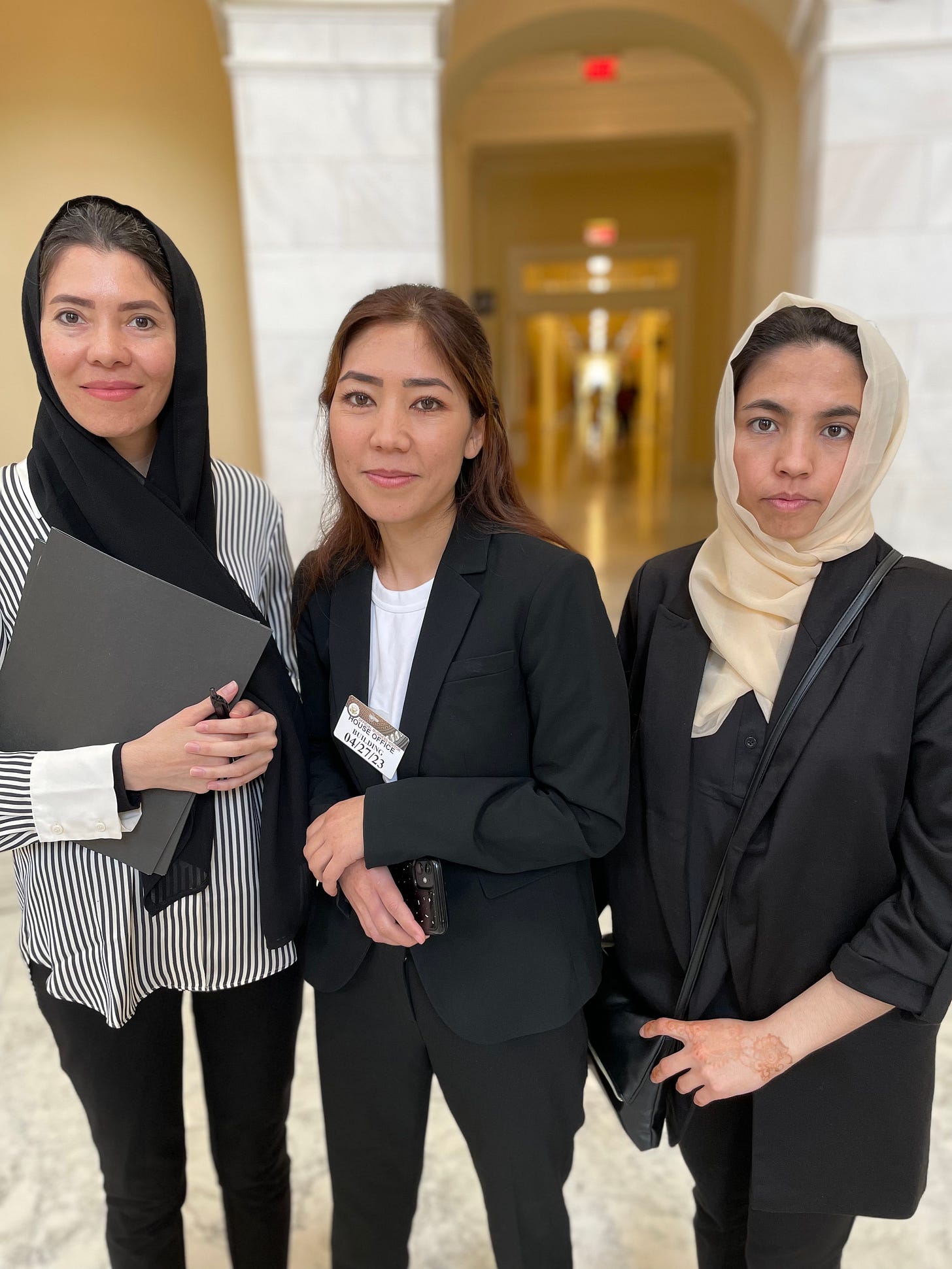Where are They Now?
An update on unlikely stories, from the Afghan Female Tactical Platoon to the Dignity Index for political speech.
The Afghan Female Tactical Platoon
I wrote a story about an extraordinary group of women in POLITICO magazine in 2022. This was a covert unit of highly trained female Afghan soldiers who had fled the country, on the run from the Taliban, after the fall of Kabul. Their American military counterparts had helped them escape to America, where they were working at Chick-fil-A restaurants and coffee shops and trying, day by day, to build purpose and hope—far from their families, their uniforms and their weapons.
Since it came out, many of you have asked me how the women are doing. There is a lot to say! Alongside American veterans, the women have met with 24 members of Congress, asking them to create a path to legal residency for themselves and the 72,000 Afghans who landed here after the Taliban returned to power. With the tireless support of Sisters of Service, these women have learned English, run 5k races and met with Gen. Mark Milley, who was then the Chairman of the Joint Chiefs of Staff. They’ve gotten bad jobs and then better jobs. They have danced and cried and grieved with one another.

Late last year, the Platoon members came together to transform Army uniforms, traditional Afghan clothing and the clothes they wore during the evacuation into works of art, which were exhibited at a gallery in New York City. They visited the 9/11 Memorial and the Statue of Liberty. With the help of a squad of pro bono lawyers, 35 of the 42 women have now—finally—been granted asylum in the United States (although the Afghan Adjustment Act still has not passed through Congress).

It will take at least another year for any of these women to receive green cards, but when that happens, many remain determined to serve in the U.S. military. For them, the mission continues. I have observed them long enough now to know that, one way or another, they will never stop fighting for the rights of girls and women in Afghanistan and beyond. (If you’d like to learn more about the women and how to support their efforts, check out the Sisters of Service website.)
The Dignity Index
Wonder why it has taken over two years for elite special operators like these women to be granted permission to remain in the U.S.? Keep in mind that these women were highly vetted before they were ever allowed to serve alongside U.S. Green Berets, Navy SEALs and Army Rangers in Afghanistan. They are well-known and well-respected by our own soldiers. What was the hold up?
You guessed it! Political polarization has clogged the halls of government, and the casualties are everywhere. High conflict makes even fixable problems (about which there is bipartisan agreement) very, very hard to manage. Sigh.

So what is being done about this problem, the high conflict that makes every obstacle we face dramatically bigger? That was the focus of another POLITICO story I was lucky enough to write exactly one year ago. An intrepid band of do-gooders had created a way to score the meanness or grace of politicians’ words in hopes of nudging them towards decency and away from vitriol. It was called the Dignity Index, and my story followed the beta launch of the tool during an election season in Utah.
It sounds painfully naïve, I know. Our media and politics incentivize toxicity, by design. Actions matter more than words. I know. I wondered if anything more would come of it.
Well, one year later, the Dignity Index continues to get smarter and stronger, just in time for what is sure to be a horrific election season. Here are some of the updates from Unite, the team behind this whole, wacky idea:
The Dignity Index is going national. Two scoring panels (both chosen for a diversity of political viewpoints) will be scoring political language used in the presidential campaigns through election day 2024.
And it’s going high-tech. For now, the scoring is done entirely by humans. But Unite is working with a partner at the University of California, Berkeley, to create an AI tool that can instantly score speech according to the Dignity Index.
The Dignity Index has been shared with governors, state legislators, city councils, college campuses, school districts and business leaders nationwide.
With leadership from some of the college students featured in my story, Unite is creating Students For Dignity chapters at universities across the country.
Words matter because emotions matter. Grievances drive action, including violent ones. “Your brain doesn’t know the difference between a wound to its dignity and a wound to its body,” according to Donna Hicks, author of the book Dignity and an adviser to the Dignity Index. In conflict zones all over the world, Hicks has found that the biggest obstacles to peace are perceived violations to dignity (which she defines as “our inherent value and vulnerability as human beings”). So maybe it’s not naïve, after all…
Social Media for Good?!
Do you wish you could test what would happen if people saw different content on social media?
The Prosocial Ranking Challenge is soliciting algorithms to test, with $60,000 in prize money split among ten finalists. Finalists will be scored by a panel of expert judges, who will then pick five winners to be tested experimentally.
Learn more about how to submit your ideas here. (I am not affiliated with this challenge, but I am passing it along because I am very interested to see what happens.)
Here’s to better algorithms and other unlikely stories,
Amanda
© 2024 Amanda Ripley. See privacy, terms and information collection notice.






Just read this beautiful piece. Thank you Amanda for always highlighting these amazing women who have captured our hearts. Command Purpose and Jenn Hassin were privileged to work with you and Sisters of Service on Project Raha this year, thank you so much for highlighting that initiative!
Awesome story! Thanks for sharing this uplifting wonderfully brave group's story!